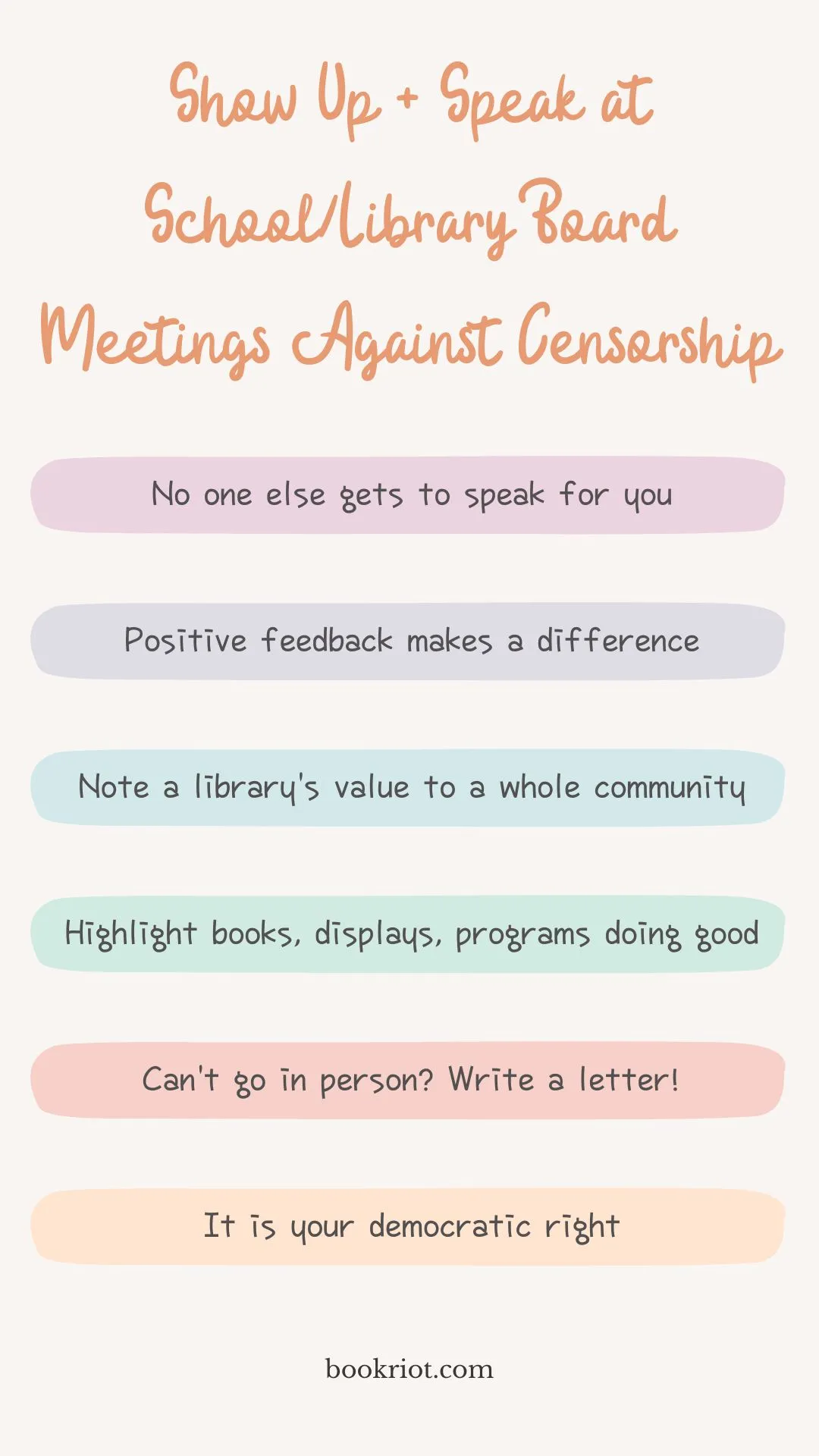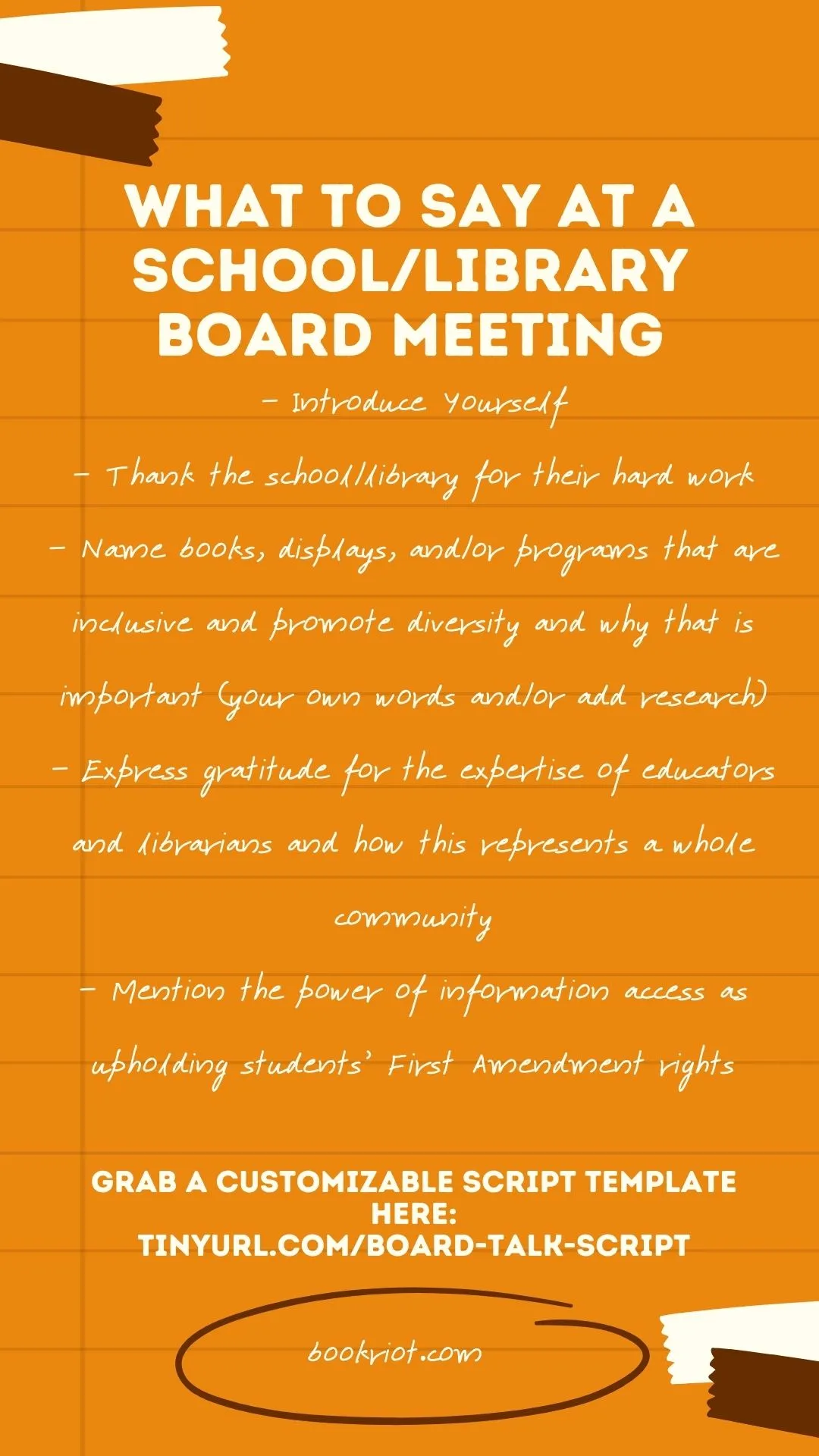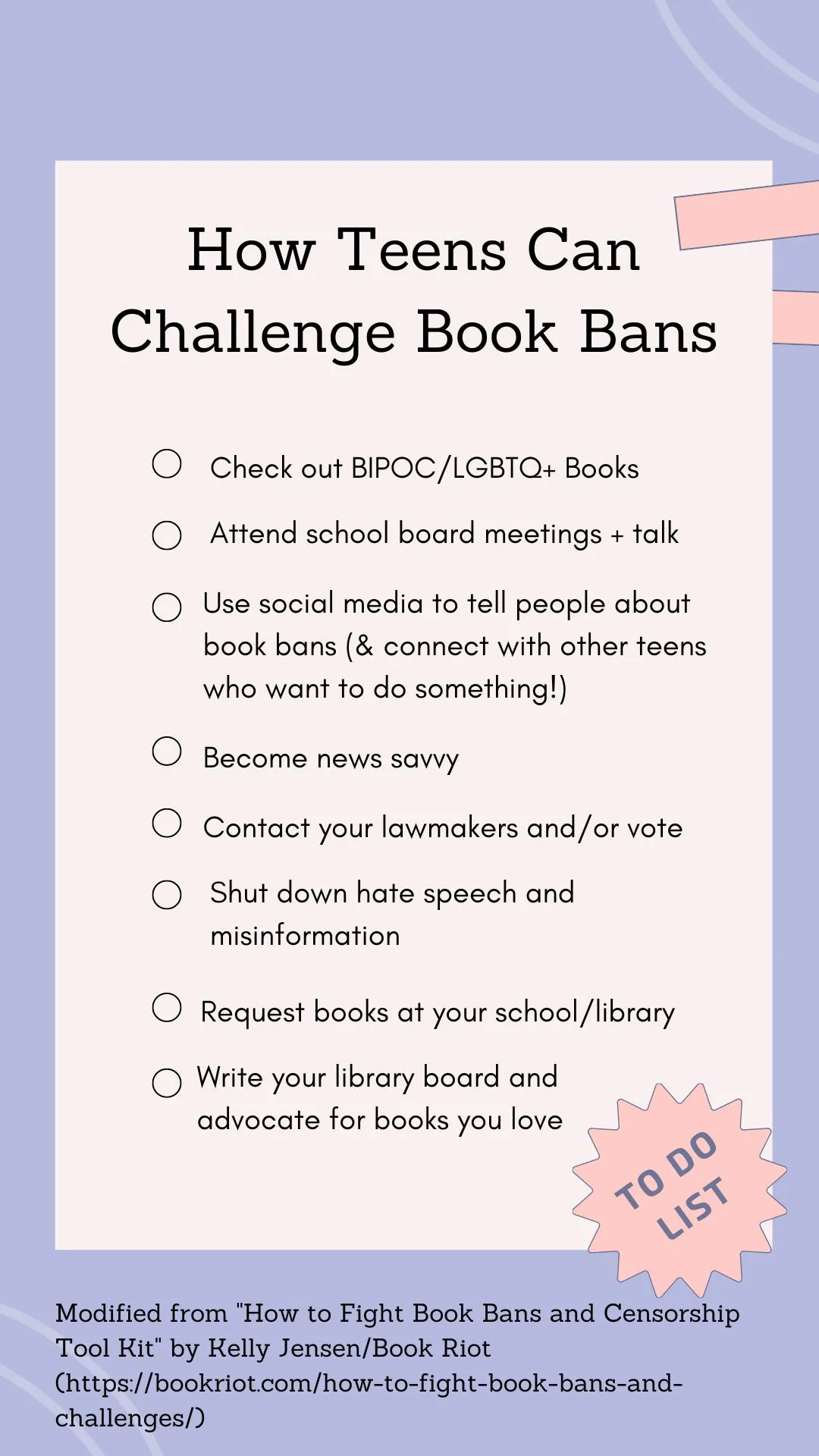
A Template for Talking with School and Library Boards About Book Bans: Book Censorship News, August 5, 2022
I’ve been going through the incredible responses to a survey on what tools and information would be helpful for fighting back against book bans. One thing that popped up was having quick templates and guides to action for folks who want to do something but don’t know where to begin. Today, let’s look at how to talk at school board and library board meetings. There is a downloadable template included, as well as a shareable graphic for social media.
Why Talk at a School or Library Board Meeting
Every public school and library board meeting provides time for citizens to speak what’s on their mind, whether or not it is an agenda item. Depending on the municipality, this might be two minutes or up to five minutes. Right now, right-wing groups are utilizing this public address time to challenge books they don’t like, sometimes doing little more than reading passages from the books in question to fill the time.
How to Talk at a School or Library Board Meeting
All board meetings must have an agenda posted in advance. This might happen on their websites and/or on the public announcements space in the facility (for example: my local public library posts their agendas on the outer doors of the building, as well as online). There is likely a contact form or address on these agendas that asks if you’d like to make a public comment. You need to be in touch in advance–they will give you a timeframe, usually 24-48 hours prior to the meeting–to get on the public comment time. They do this not to screen comments but to allot enough time for everyone.
You can do this for each and every meeting. The more you show up, the more your voice and the voices of those like yours are represented.
What to Say at a School or Library Board Meeting
What you say is important, but it’s not more important than showing up to talk. If what you want to say is as simple as “Thank you for having queer books available in the library for all ages,” that is as important as a longer comment naming specific titles or citing research on the value of such books in a collection.
- Here is an example of a longer speech given at a public library board meeting. Although the outcome of the broader story is still underway, the speech itself is an outstanding example of pulling in research and naming specific reasons why banning books doesn’t serve a whole community.
- Here is an excellent example of how people showing up in support of a library’s decision–in this case to have Pride displays–outweighs those who come to complain.
- Here’s another excellent “what to do when” related specifically to Pride displays, but this is applicable for any topic, including social justice, race, and those similarly challenged.
If you don’t show up to talk, know that other people are talking for you. In many communities–conservative or not–groups like Moms For Liberty claim they speak on behalf of all parents, but that is far from the truth. No one gets to speak for you except you.
What To Do If You Can’t Come to a School or Library Board Meeting
There are a host of valid reasons why you may not be able to make a library board meeting in person or virtually. If you can’t show up, that’s okay–writing letters is as important and as powerful.
Letters sent to boards are included in their board packets, meaning that the board will see the letters sent to them or for them. Often, packets are made available in advance of a meeting, so you’ll want to time your letter to hit a week or so before the meeting to get into the current packet.
Much like public comment time matters because it is time allotted for hearing from the citizens of a community, so too are letters. They do not need to be long or in depth. Again, a short “thank you for having this” can go miles.
Sample Script for School and Library Board Comments
You can download this template here in the form of a Google Doc. Adapt to fit your needs, whether you are speaking in person or writing a letter.
Dear Board Members:
My name is [fill in the blank] and I am a resident of [your community]. I want to take the time to thank our great [name your library/school] for providing a wide range of materials to our diverse community. Tax money spent to represent the whole of a community is money well spent.
[Space here to elaborate on specific titles or types of books, i.e., Having books like Gender Queer in the high school library ensures that students learn and experience what it is to question one’s gender identity. You may like to cite research on how access to such books is developmentally appropriate and has psychological benefits.]
[Alternately, use this space to talk about book displays you’ve seen across the library or lists you’ve seen and utilized on their website or social media presence. Example: Seeing the Pride book displays in the library helped me/my child be seen and/or helped me find new and excellent books to read I may have otherwise not found on my own.]
In an era of restricting ideas and a time when book bans continue to be on the rise [you may like citing research from PEN America here] from a small but vocal minority, I speak on behalf of the First Amendment rights of students and community members to access the materials they wish to. You have talented and competent professionals using their expertise to the best of their ability, and they deserve that recognition.
Thank you for your time.
[Include a signature if a letter].
Make Attending Meetings A Social Event
If groups like Moms For Liberty make board meetings a social event, so, too, should those who oppose book bans and censorship. Here’s how you can do that:
- Distribute meeting dates to your local friends, family, and social groups and all plan on showing up
- Decide to have a group of people speak back-to-back on censorship issues
- Bring young people to the meetings–your children seeing democracy in action, whether they choose to speak or not, is a powerful reminder of their rights. Be conscious of letting them know what they may hear, though, as it could be surprising the level of hate leveled at groups of which they may be part.
- Wear matching colors or create some kind of logo that unites all of you in your message. For example, you could use this image that makes clear no one else speaks for you on topics related to “parental rights” (saved as a both an image and a .svg file). This logo would stand out on purple or black or gray tops.
- Record and photograph folks who go up to the mic to speak in support of First Amendment rights and share that on social media
- Share the below graphics and templates to amp up supporters who know they will be in like-minded, proactive company
Downloadable and Shareable Material
All of these items are available to download and share across social media as appropriate. Credit is already listed on each image.
Why it is important to show up to school and library board meetings

What to say during public comment time at school or library board meetings (applicable to letter writing, too)

What can young people do to combat book bans happening in their schools and libraries

Book Censorship News: August 5, 2022
This will be split into two parts this week, as there are two big factors in book censorship right now: the books being censored and the new library/classroom materials policies being instituted across the country–most of which will have a detrimental impact on the kinds of books young people have access to. These policies are being created to appease groups like Moms For Liberty, as opposed to ensuring intellectual freedom and First Amendment Rights for all people.
- Starting with a longform piece from PBS Wisconsin that draws together how queer panic emerged from the pandemic and how it turned to book challenges…which led to far more extreme-right behaviors in a small Wisconsin town.
- A Selectman in Greenwich, Connecticut, is among those complaining about Gender Queer in the public library.
- Absolutely True Diary of a Part-Time Indian and In Cold Blood will remain in North Lamar Independent School District (TX).
- Northern Valley Regional High School at Old Tappan in New Jersey is dealing with a challenge of All Boys Aren’t Blue. “Woodcliff Mayor Carlos Rendo, a Republican and a former candidate for lieutenant governor, is calling for parents to go to school board meetings and call for the book’s removal.” Of course he called it grooming, the dogwhistle to his constituency.
- “After their review, the committee members agreed to recommend removing five books from circulation. Those included “Tricks,” a young adult novel about teen prostitutes, and “It’s Perfectly Normal,” a children’s picture book about sex.” This is in Pinellas County Schools (FL). It’s Perfectly Normal, written for young readers, is apparently not appropriate for young readers. The other book is “dated.”
- Queer books are under fire in the Victoria Public Library (TX) and county commissioners threatened to evict the library from its building if they do not remove material. The mayor says that cannot happen.
- A censorship-friendly hate group in Forsyth County, Georgia, modeled after Moms For Liberty, is suing the district for having their First Amendment rights squashed. Read that one again.
- The Sanibel Public Library Board began their discussion of queer books being challenged in the library–drawing a crowd of over 50–but the decision has been tabled for now (FL).
- “At the meeting, Cochran distributed a flyer that included a link to a list of more than 600 “books to avoid,” which labeled the books based on content. The labels are: “abortion, anti-police, bisexual, drugs, gay, gender identity or fluid, occult, racism, rape, sex, trans.” Some books received multiple labels. The list gives no additional information or context about the content of the books. Cochran said she believes that library books are “grooming” children into identifying as gay or transgender.” This is at the Coeur d’Alene (ID) public library, where “Kootenai County Regan Republicans” have been following the Heather Scott book ban playbook.
- The bulk of books removed from Alpine School District (UT) are queer books.
- State lawmakers got two graphic novels—Gender Queer and Flamer–removed from Tulsa Public Schools (OK).
- Wilkes County schools (NC) are ending their popular Battle of the Books events because of content complaints within some of the books. Way to kill a love of reading.
- Currently, Abilene Public Library (TX) is forming a committee to determine the fate of Let’s Talk About It, but the group of citizens complaining about that title aren’t done. “This group of Abilene residents also made an appearance to tackle another issue: 100 or more books many feel should be removed from the Children and Young Adult sections, and moved to its own section focused on sexuality.” If you’re in Abilene, know these parents are speaking FOR you.
- In good (?) news, the Miami School District (FL) is not going to reject sex ed textbooks, as going most of a school year without sex ed would be bad.
- “Twigg does not believe that reading the offending books is important or necessary. When I asked him if he had read the books, his response was: “I don’t have to, I’ve heard enough at the School Board meetings.” Take a moment and consider that. An official, elected to a School Board where his duty should be to the teachers and students of the county, does not feel a need to read a book before removing it from library shelves, thereby depriving students the opportunity to read that book.” This is the Spotsylvania School District (PA), which you may remember because Mr. Twigg advocated for burning books last fall.
- Gilbert Public Schools (AZ) are dealing with complaints about Looking for Alaska and The Perks of Being a Wallflower. Equally disturbing are the suggestions for how parents can easily access more material to challenge.
- Gender Queer is under fire in Jefferson County Public Schools (KY).
- New Hanover, North Carolina, has parents taking a list of books to the sheriff to complain about them being obscene.
- Mike Hixenbaugh, who has done stellar work covering censorship in Texas, shared a recent complaint brought to a library about Ash.
- “Obtained from Jecker after the meeting, the list includes 57 books. Assistant to the Superintendent Lin Rae Howard said that of the 57 books, 22 are in the high school, six are in the middle school, three are in the intermediate school, and one is in the elementary school. There are not 32 different titles but actually 27 books, because five of the books are at multiple schools.” The school board director for Pleasant Valley School District (PA) wants investigation into these books, per a list of titles parents gave her. I wonder if they’re from the Moms For Liberty list or No Left Turn list.
- “One woman objected to the ‘unbelievable disgusting’ educational subjects ‘our children are being indoctrinated with.’ She contrasted the statements that the new standards are purported to be inclusive while autistic children are not being treated inclusively. She did not like the ‘sex education’ curriculum. ‘It’s not your duty. That’s something that parents should be talking to their children about.’ She was concerned about interference with families’ ability to have faith-based discussions with their children on the topics. She pointed out while children need to know about diseases and pregnancy, other topics are not necessary for young children. ‘They have a right to an innocent childhood.'” The word soup these censors use is impressive, honestly. This is in Sparta, New Jersey, over sex education.
- Ending this section with good news: the opt-in policy Polk County Schools (FL) planned to implement for books is now reversed, meaning that by default, the books will be available. Parents will need to opt their kids out instead. This is how it should be.
Materials Policy News
- “At one point, Cullen compared books to e-cigarettes. Book publishers are secretly pushing agendas, she said.” This is Pennridge School District (PA). The ACLU is absolutely on the case for how far this is going.
- Kettle Moraine School District (WI) just banned pronouns and Pride flags and rainbow attire. This district has been embroiled in lawsuits from “concerned citizens” to limit such free speech to people since spring 2021.
- “Once enacted, only the parents whose child or children attend the school in which the divisive concept incident occurred may file a complaint to the principal of that school, Hetager said.” In Savannah, Georgia, they’re trying to figure out how to teach things like Jim Crow laws without violating the law.
- Amherst County Public Schools (VA) are in the process of developing a committee to create their library materials policy. Everything about that sentence tells you how they feel about the expertise of trained librarians and educators. They want to base their new policy off Roanoke schools.
- As a reminder, here’s Roanoke’s new policy: “A new policy for school library book purchases requires that two elementary school librarians must now read and write a review for each book in order to consider it for the library’s collection. For a book being considered for the middle school or high school level, the policy appears to acknowledge the greater lengths of those books, as only one librarian is required to read and write a review. After the reviews are written, all librarians at all levels must approve of the book for the purchase to go forward.”
- Carroll ISD and Keller ISD in Texas both adapted new materials policies, based off the state-created Texas Education Agency model. This is going to lead to a lot of problems. (But we knew that).
- Madison County Public Schools (MS) are moving 10 books into a “restricted area.” This is still censorship.
- It’s Still Censorship, Even If It’s Not a Book Ban: Book Censorship News, August 30, 2024
- Are You Registered to Vote?: Book Censorship News, August 23, 2024
- What Is Weeding and When Is It Not Actually Weeding?: Book Censorship News, August 16, 2024
- How To Explain Book Bans to Those Who Want To Understand: Book Censorship News, August
- A New Era for Banned Books Week: Book Censorship News, August 2, 2024
- The Ongoing Censorship of High School Advanced Placement Courses: Book Censorship News, July 26, 2024
- The Quiet Censorship of Pride 2024: Book Censorship News, July 19, 2024
- Survey: What Happened During Pride Month? Book Censorship News for July 5, 2024
- The First American Union Understood The Necessity of Public Libraries and Education: Book Censorship News for June 28, 2024
- Here Come The Public School Closures: Book Censorship News, June 21, 2024








